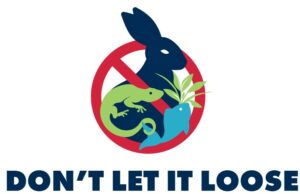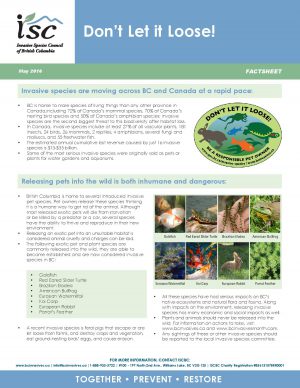
Invasive species negatively impact on our environment and economy. They can out-compete native species for food and habitat, damage ecosystems, and introduce parasites and diseases. Unfortunately, some of the most threatening invasive species were originally sold as pets or plants for water gardens and aquariums.
All pet and aquarium owners should be aware of the species they are keeping and ensure that they are contained.
Responsibility of Pet & Aquarium Owners
Before purchasing a pet or installing a pond or aquarium, potential owners should know and understand the life cycle and needs of prospective pets.
If the pets become too overwhelming to care for, they are sometimes let loose into nearby woods or waters. This can become a serious problem as a variety of aquatic plants, invertebrates, reptiles, and fish have the potential to become invasive.

Don't Let it Loose
It is illegal and inhumane to release exotic pets into the wild!
When pet owners are unable to care for their pets, some think the best option for their pets is to be released into the wild. This can be extremely destructive to ecosystems. Some exotic pets are well suited to their new environment, and once established, they can take over, reducing native populations and changing the structure of the ecosystem.
However, most likely, exotic pets won’t survive release and will meet cruel fates. They could starve, be preyed upon, or be hit by cars. It is inhumane to release an animal into a novel environment, and charges could be laid (BC SPCA; Controlled Alien Species BC).
Common Invasive "Pets" in BC
Invasive Aquarium Plants
What Can You Do?
Think twice before releasing unwanted pets into the wild. Here are a number of responsible and humane alternatives.
- Contact the place where you purchased the animal to see if they will take it back.
- Contact local science centers, zoos, or aquariums to see if they can use the animal for educational purposes.
- Contact local animal rescue centers or networks.
- Dry and freeze unwanted aquatic plant material and add it to non-composted trash.
- If all else fails, have a qualified veterinarian euthanize the animal in a humane manner; it’s far kinder than letting it starve to death in the wild or destroy the homes of native animals and plants.
- More on what to do about Koi and Goldfish here.

If you think you’ve spotted an invasive plant or animal out in nature:
- Report sightings to ssisc.ca/report
- Report ALL sightings of invasive mussels to the B.C. Conservation Officer Service (RAPP): 1-877-952-7277
Links
- Don’t Let it Loose Factsheet (PDF)
- Provincial Don’t Let it Loose Program
- Resources for Teachers and Educators (including Don’t Let it Loose activities)
- Inter-Ministry Invasive Species Working Group – List of Priority Invasive Species and Factsheets
- Provincial resources for educators (including Don’t Let it Loose content)
- Invasive Goldfish and Koi in the Sea to Sky: We need your help!
Thank you for your support!
Thank you to the following businesses who are participating in our 2024 Don’t Let it Loose campaign:





